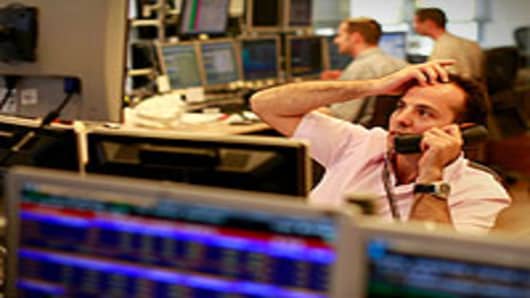There are two types of investors at the moment, according to Paul Donovan, the senior economist at UBS.
There are those obsessed by the debt crisis and fretting over market meltdown and those focusing on the positives, like emerging market growth, Donovan told CNBC Tuesday.
But with stocks across the world selling off and the euro sharply lower on the week, fears over the debt crisis are driving more and more people towards the more bearish camp.
“Two years ago no one questioned whether a euro zone member would default," he said. "Now people are questioning if the euro will even exist in three years."
Donovan dismissed allegations from European politicians that the current crisis is being caused by speculators, but rather the market is facing a major crisis of confidence.
Fueling this crisis are fears that one or more euro-zone members could restructure or default on their debt, he said.
“Greece can get its debt down. The question is whether Greece can get its debt down to sustainable levels," Donovan said. "I believe it cannot do this without restructuring."
More to Worry About
A chief concern now is that the Spanish banking industry could become a major problem, Linda Yueh, a Fellow in economics at Oxford University, told CNBC.
"Can the Spanish government afford to bailout the regional banks given pressure on its fiscal position?" Yueh said. "People are already questioning if the recent shock-and-awe rescue package will be big enough."
If the package turns out to be too small, the market could get worse. And if that happens, the recession will return, according to Stephen Lewis, chief economist at Monument Securities.
"If sovereign debt concerns are accompanied by worries over bank liquidity any more significant than those currently influencing the credit market, another dip in world economic activity would seem a sure thing," Lewis said.
That sentiment is yet to gain much traction with investors, with many still focusing on the policy response.
"Either cutting fiscal stimulus too early or monetary tightening could take us back into recession," Yueh said.
Ashraf Laidi, the chief strategist at CMC Markets said the Spanish banking bailout is a big worry but believes the European Central Bank could be a bigger problem.
"The ECB is injecting billions of euros into the economy via bond purchases, this is boosting liquidity and is quantitative despite the ECB’s commitment to sterilize purchases," Laidi said.
The euro is going lower with any uncertainty being negative for sentiment, he added.
"Any sign of instability is bad for markets," he said. "Spanish banks; German indecision on the rescue package, all of this is fueling uncertainty. The market is chasing the euro down to 1.17 against the dollar in the short term."
Can You Fly to Safety?
Many investors are beginning to look beyond the euro-zone debt crisis nervously at the moment.
One bear made the case recently that the problems in Europe will spread to 32 US states with big budget deficits over the coming months forcing the Federal Reserve to raise borrowing costs to attract money into both Treasurys and municipal bonds.
Then the real trouble starts, he said.
This doomsday scenario could well be wide of the mark, but investors have learned over the last three years that today’s doomsday scenario can quickly become the next Sunday in the office waiting for policymakers to respond before the market opens in Tokyo.
Much has been made in recent days about a so-called flight to safety trade benefiting the US. The argument goes that because of the selloff in Europe investors are running back to the safety of the dollar and the US bond market.
Cyril Beuzit, the head of interest rate strategy at BNP Paribas, said the supply usually becomes a problem for the market once growth comes back.
"In the short run if you believe that policy responses to the crisis will be deflationary then US Treasurys and Bunds will do well," Beuzit said.
Despite very small yields on US and German 10-year paper, Beuzit said safety is the major concern at the moment and believes that trend will continue over the short term.
"There have been different phases in this crisis, when it was only Greece," he said. "Ten-year US yields where trading at 4 percent. Now the fears are wider, US 10-year yields could break below three percent and we expect equities, currencies and commodities to remain very volatile."




